Kathleen Jones's Blog, page 71
March 15, 2012
Travelling, travelling, travelling .......
So far four trains, two buses, a plane, a London underground ride and a taxi; two hotels and a succession of coffees in paper cups and tasteless sandwiches. No wonder I'm feeling a touch jaded. And my poor laptop has been trying to connect to so many internet hotspots it's become confused! I'm currently in Ipswich giving a talk on Katherine Mansfield to the Suffolk Book League - a lovely group of book enthusiasts it was a pleasure to meet. Waterstones even managed to sell a few books. But I wonder whether audiences have any idea what an effort writers make to meet readers and talk to them about their work?
I haven't been to Ipswich before and at first glance it seems like most modern English town centres - hardly any old buildings left and most space taken up by a pedestrianized shopping mall with all the usual suspects; Monsoon, Debenhams, H&M, McDonalds, Gap, Benetton, Costa coffee, M&S. There is, apparently, another face to Ipswich - the waterfront - which I haven't seen yet.

There are lots of very young mums here, strolling around with their babies in buggies - some of them don't even look old enough to have left school. That's something you don't see in Italy and I wonder why? Do Italian girls have better things to do than have babies as teenagers? Most wait until their late twenties or early thirties. Cultural differences? The family group is certainly stronger and more important in Italy than it is over here, so perhaps young girls feel less compelled to begin their own. But there's also a demographic shift in Italy - the birth rate is dropping and the government are worried about it.
Now I'm about to start the journey again in reverse - taxi, trains, bus, plane (fog permitting) and hopefully Neil will be waiting for me at Pisa airport around midnight. It's sunny over there he tells me and tonight the sky should be clear enough to get another look at Venus and Jupiter together - the brightest objects in the night sky.
I haven't been to Ipswich before and at first glance it seems like most modern English town centres - hardly any old buildings left and most space taken up by a pedestrianized shopping mall with all the usual suspects; Monsoon, Debenhams, H&M, McDonalds, Gap, Benetton, Costa coffee, M&S. There is, apparently, another face to Ipswich - the waterfront - which I haven't seen yet.

There are lots of very young mums here, strolling around with their babies in buggies - some of them don't even look old enough to have left school. That's something you don't see in Italy and I wonder why? Do Italian girls have better things to do than have babies as teenagers? Most wait until their late twenties or early thirties. Cultural differences? The family group is certainly stronger and more important in Italy than it is over here, so perhaps young girls feel less compelled to begin their own. But there's also a demographic shift in Italy - the birth rate is dropping and the government are worried about it.
Now I'm about to start the journey again in reverse - taxi, trains, bus, plane (fog permitting) and hopefully Neil will be waiting for me at Pisa airport around midnight. It's sunny over there he tells me and tonight the sky should be clear enough to get another look at Venus and Jupiter together - the brightest objects in the night sky.
Published on March 15, 2012 02:56
March 12, 2012
Tuesday Poem: A Syrian Poet in Homs - Tal al-Mallouhi
 You will remain an example
You will remain an example
I will walk with all walking people
And no
I will not stand still
Just to watch the passers by
This is my Homeland
In which
I have
A palm tree
A drop in a cloud
And a grave to protect me.
This is more beautiful
Than all cities of fog
And cities which
Do not recognise me
My master:
I would like to have power
Even for one day
To build the "republic of feelings."
Tal al-Mallouhi
(Translated by Ghias al-Jundi)
Tal al-Mallouhi is a young Syrian poet and blogger, born in Homs, arrested aged 19 accused of spying for foreign countries and sentenced to 5 years in prison in 2009. This is her brief biography from the internet:
"al Dosr al-Mallohi (al-Mallouhi) (Arabic: طل الملوحي ) born in Homs January 4, 1991. She is considered the World's youngest prisoner of conscience. On 27 December 2009, Tal was taken from her home by officers of one of the security offices in Syria because she has written poems about Palestine and social commentaries on her blog. Since then, her parents don't know which security office has detained her nor where they can visit their daughter. Tal al-Mallouhi has been accused by the Syrian government of being a spy for the United States of America, and sentenced on February 15, 2011 to five years in prison."

For more about her situation please look up English Pen who are trying to publicise her plight by sharing her poetry with as many people as possible.
For more Tuesday Poems please visit the Tuesday Poem website at http://www.tuesdaypoem.blogspot.com
where thirty poets from around the world post a poem every Tuesday.
And today the wonderful Michelle McGrane has featured my new collection 'Not Saying Goodbye at Gate 21' on the brilliant poetry site 'Peony Moon' . Thanks Michelle!
Published on March 12, 2012 07:04
March 8, 2012
40 Women Sculptors for International Women's Day
As it's International Women's Day today, I thought it might be appropriate to post something about an exhibition celebrating the work of 40 women sculptors who have lived and worked in Pietrasanta during the last fifty years.
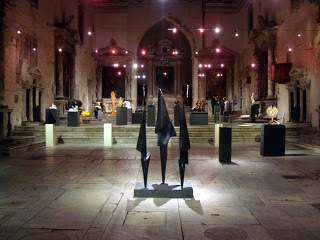
Whatever you think of gendered events, (and I know many of the women here are very ambivalent about them) it's difficult to turn down the opportunities that positive discrimination sometimes presents. The work featured in this exhibition is extremely varied in style and subject matter and the sculptors come from almost every part of the world, including USA, Italy, Norway, Venezuela, Russia, Europe, and Japan.
They were all interesting, and I had my own personal preferences, but here are some that I found really interesting. Sadly, one of my favourites, 'Dancing in the clouds' by American Shelley Robzen, can't be shown because it was highly polished black marble in a spotlighted situation which didn't photograph. In fact, it was difficult to get any good photos at all, given that the church 'St Agostino' has no natural light.
My favourite artist of the older group, Alicia Penalba (from Buenos Aires) died in 1982. Her 'Trilogie' - the three bronze figures standing at the entrance to the church, is really beautiful.
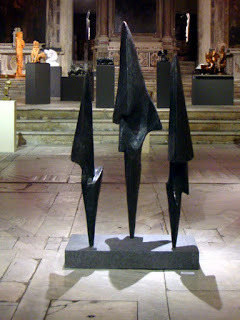
The gesso maquette for Grand Gisant reminded me of dinosaur vertebrae.
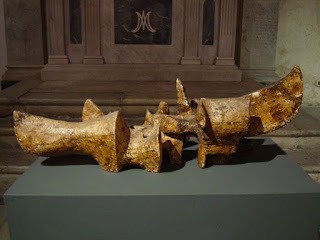
Again in the older group, the Italian Fiore de Henriquez who died in 2004, had a strange, almost feral bronze figure, full of quite violent life. It's called 'Ippogrifo' - the Hippogriff.
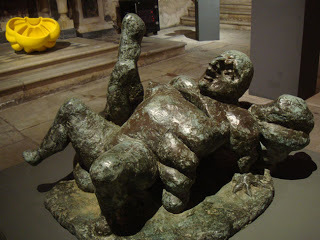
I loved this small, alien landscape with its lonely figure by American Jill Watson who now lives near Pietrasanta. It's called Giardino - garden.
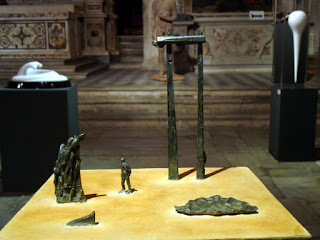
This relief, by Swiss artist Maja Thommen, looks simple, but is incredibly intricate. She's a very interesting artist who paints, creates installations and also performs with a gypsy punk band. It's called Donna Velata - veiled woman.
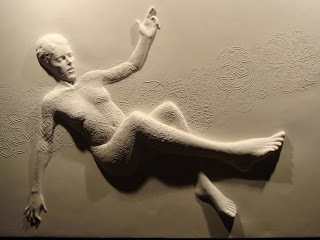
Dutch sculptor Margot Homan exhibited this bronze figure of a women holding her finger to her mouth - Il Silenzio. It's very finely balanced.
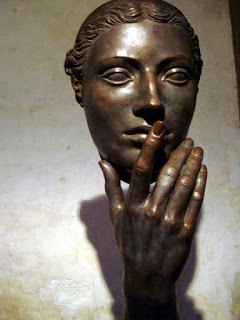
There were some images that I found quite disturbing, including this male, almost zombie-like figure by young Italian artist Elena Bianchini.
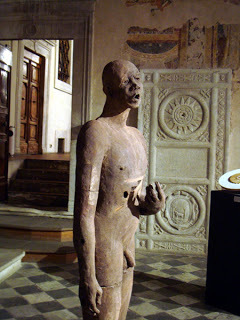
Altogether a fascinating exhibition. I'd have loved to do a creative writing workshop with it!


Whatever you think of gendered events, (and I know many of the women here are very ambivalent about them) it's difficult to turn down the opportunities that positive discrimination sometimes presents. The work featured in this exhibition is extremely varied in style and subject matter and the sculptors come from almost every part of the world, including USA, Italy, Norway, Venezuela, Russia, Europe, and Japan.
They were all interesting, and I had my own personal preferences, but here are some that I found really interesting. Sadly, one of my favourites, 'Dancing in the clouds' by American Shelley Robzen, can't be shown because it was highly polished black marble in a spotlighted situation which didn't photograph. In fact, it was difficult to get any good photos at all, given that the church 'St Agostino' has no natural light.
My favourite artist of the older group, Alicia Penalba (from Buenos Aires) died in 1982. Her 'Trilogie' - the three bronze figures standing at the entrance to the church, is really beautiful.

The gesso maquette for Grand Gisant reminded me of dinosaur vertebrae.

Again in the older group, the Italian Fiore de Henriquez who died in 2004, had a strange, almost feral bronze figure, full of quite violent life. It's called 'Ippogrifo' - the Hippogriff.

I loved this small, alien landscape with its lonely figure by American Jill Watson who now lives near Pietrasanta. It's called Giardino - garden.

This relief, by Swiss artist Maja Thommen, looks simple, but is incredibly intricate. She's a very interesting artist who paints, creates installations and also performs with a gypsy punk band. It's called Donna Velata - veiled woman.

Dutch sculptor Margot Homan exhibited this bronze figure of a women holding her finger to her mouth - Il Silenzio. It's very finely balanced.

There were some images that I found quite disturbing, including this male, almost zombie-like figure by young Italian artist Elena Bianchini.

Altogether a fascinating exhibition. I'd have loved to do a creative writing workshop with it!
Published on March 08, 2012 03:48
March 6, 2012
Tuesday Poem: Minding Isabella
She isn't sure of me, this occasional person
she calls Abuela, whose DNA she shares
across two generations and two languages.
I don't always understand her. 'Agua' she says
holding out a cup. 'Donde esta mi madre?'
The lip quivers, and her face tilts up, reflecting
mine. A small hand slips between arthritic fingers
unable to unlatch the harness of the car seat
that she mustn't wriggle out of. Precious cargo,
Isabella; daughter's daughter. Mine for today.
Copyright Kathleen Jones
This is unashamedly sentimental. I've just been back to England for a few days to look after my small grand-daughter - a lovely, and exhausting, experience. She's just beginning to talk and often difficult to interpret. My daughter is trying to bring her up to be bi-lingual, so some things she says are in Spanish, others in English. 'Abuela' is Spanish for grandmother, and I love it. The biggest challenge, since I have the writers' curse, RSI, in my wrists, was locking and unlocking all the child-proof things - buggies and car seats etc. A nightmare!
I'm also experimenting a bit with forms. This one's ten lines, each line 12 syllables (approx), which is an interesting short form to work with. There are two lines that don't quite work yet, so more editing necessary!
For more Tuesday Poems please visit the main site: www.tuesdaypoem.blogspot.com

she calls Abuela, whose DNA she shares
across two generations and two languages.
I don't always understand her. 'Agua' she says
holding out a cup. 'Donde esta mi madre?'
The lip quivers, and her face tilts up, reflecting
mine. A small hand slips between arthritic fingers
unable to unlatch the harness of the car seat
that she mustn't wriggle out of. Precious cargo,
Isabella; daughter's daughter. Mine for today.
Copyright Kathleen Jones
This is unashamedly sentimental. I've just been back to England for a few days to look after my small grand-daughter - a lovely, and exhausting, experience. She's just beginning to talk and often difficult to interpret. My daughter is trying to bring her up to be bi-lingual, so some things she says are in Spanish, others in English. 'Abuela' is Spanish for grandmother, and I love it. The biggest challenge, since I have the writers' curse, RSI, in my wrists, was locking and unlocking all the child-proof things - buggies and car seats etc. A nightmare!
I'm also experimenting a bit with forms. This one's ten lines, each line 12 syllables (approx), which is an interesting short form to work with. There are two lines that don't quite work yet, so more editing necessary!
For more Tuesday Poems please visit the main site: www.tuesdaypoem.blogspot.com
Published on March 06, 2012 00:23
March 4, 2012
The Two Faces of Italy
I'm reading a very interesting book at the moment, 'The Dark Heart of Italy', which promises to enlighten my own ignorance of the tortuous pathways of Italian politics.
Italy is outwardly seductive - the beautiful landscape, history, art, food, wine and language. But learning - or trying to learn! - that language has made me more aware of the duality here. Just the word for icing sugar for example. In English it implies decoration, enrichment, as in 'the icing on the cake', but in Italy it is a 'veil' concealing what is underneath. This is a country where the word for cunning, 'furbo', also means cleverness and is used admiringly.
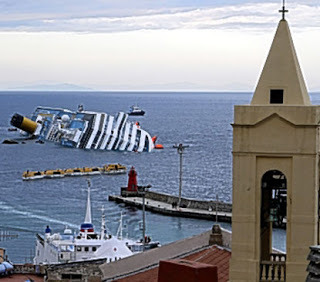 Two Faces of Italy - Catastrophe in an Idyllic Location - will Schettino ever face justice?It's a country where the rich declare less than 50,000 euros a year in earnings and drive around in Ferraris and Lamborghinis. It's a country where most attempts to bring corrupt politicians and officials to justice usually founders in a maze of judicial bureaucracy. It's called the 'muro di gomma' - the rubber wall everything bounces off.
Two Faces of Italy - Catastrophe in an Idyllic Location - will Schettino ever face justice?It's a country where the rich declare less than 50,000 euros a year in earnings and drive around in Ferraris and Lamborghinis. It's a country where most attempts to bring corrupt politicians and officials to justice usually founders in a maze of judicial bureaucracy. It's called the 'muro di gomma' - the rubber wall everything bounces off.
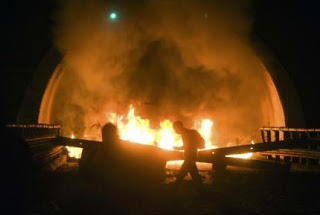
While I'm on my terrace admiring the view, northern Italy is experiencing violent unrest - to watch the news you'd think half Italy was burning. The 'No Tav' movement has blocked an autostrada and the railway lines to protest against a proposed fast rail link from Turin to Lyon. There are burning barricades and violent clashes.
Elsewhere there are demonstrations against austerity measures. One in three Italian youths doesn't have a job. The fact that you have to know someone to get a job makes things doubly hard. PM Monti has pledged to reform the labour market and create a meritocracy, but will it happen? or are the practices too deep rooted? Like Japanese Knotweed in Britain, Nepotism is wild and out of control here. You need a lot of 'furbo' to get anywhere.

Italy is outwardly seductive - the beautiful landscape, history, art, food, wine and language. But learning - or trying to learn! - that language has made me more aware of the duality here. Just the word for icing sugar for example. In English it implies decoration, enrichment, as in 'the icing on the cake', but in Italy it is a 'veil' concealing what is underneath. This is a country where the word for cunning, 'furbo', also means cleverness and is used admiringly.
 Two Faces of Italy - Catastrophe in an Idyllic Location - will Schettino ever face justice?It's a country where the rich declare less than 50,000 euros a year in earnings and drive around in Ferraris and Lamborghinis. It's a country where most attempts to bring corrupt politicians and officials to justice usually founders in a maze of judicial bureaucracy. It's called the 'muro di gomma' - the rubber wall everything bounces off.
Two Faces of Italy - Catastrophe in an Idyllic Location - will Schettino ever face justice?It's a country where the rich declare less than 50,000 euros a year in earnings and drive around in Ferraris and Lamborghinis. It's a country where most attempts to bring corrupt politicians and officials to justice usually founders in a maze of judicial bureaucracy. It's called the 'muro di gomma' - the rubber wall everything bounces off.
While I'm on my terrace admiring the view, northern Italy is experiencing violent unrest - to watch the news you'd think half Italy was burning. The 'No Tav' movement has blocked an autostrada and the railway lines to protest against a proposed fast rail link from Turin to Lyon. There are burning barricades and violent clashes.
Elsewhere there are demonstrations against austerity measures. One in three Italian youths doesn't have a job. The fact that you have to know someone to get a job makes things doubly hard. PM Monti has pledged to reform the labour market and create a meritocracy, but will it happen? or are the practices too deep rooted? Like Japanese Knotweed in Britain, Nepotism is wild and out of control here. You need a lot of 'furbo' to get anywhere.
Published on March 04, 2012 02:49
March 1, 2012
Fancy a Cheap Ferrari?
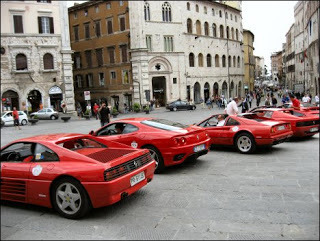
In Italy, Berlusconi's replacement, Mario Monti, is busily trying to clean up the Italian state. He's promising changes to the tax system - at the moment even the low-paid are taxed at 50%, which is why everyone avoids tax whenever possible. The black economy is huge here. But the rich are the biggest tax evaders of all and Monti is threatening to chase them up. Which is why they're selling their Ferraris and buying something less eye-catching in an attempt to evade the dreaded Guardia di Finanza - a financial police force with blood-curdling powers! So, if you want a testosterone boost, or fancy a display of machismo, the car dealers of Milan will probably be able to oblige with one of the rocket powered machines guaranteed to raise the CO2 levels of the planet even on a trip to the supermarket. Sadly, I must confess that I do experience the odd moment of lust when one roars past my modest Peugeot on the road, but my sensible self soon re-asserts itself!
Published on March 01, 2012 00:36
February 27, 2012
Tuesday Poem: Superior Corvid
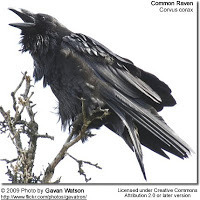
One metre long from beak to tail-tip
more black than black and curious,
quick to mimic, clever, a problem-
solver, shape-shifter, solitary
but coupling for life. (They often
live for forty years.) Gate-keeper,
talisman, prognosticator,
doom-merchant. At a distance sometimes
mistaken for the common crow.
Kathleen Jones
This is one small raven poem from my growing 'Haida Gwaii' collection which is going to be called 'Sea, Tree and Bird' and which seems to be becoming more of a meditation on how we live with the environment, though it didn't start out that way.
The beautiful Raven photo was taken by Gavan Watson and is licensed under the Creative Commons agreement.[image error]
Published on February 27, 2012 13:10
February 26, 2012
Spring has come to Capezzano
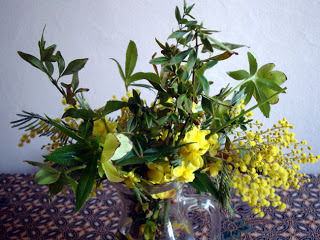
I've just come back from a very stormy England, tired and travel-lagged. Pisa airport at midnight was very cold and damp and not unlike the UK airport I'd just left. But waking up in our little house in the olive grove the following morning things looked very different. Spring has really sprung in Capezzano.
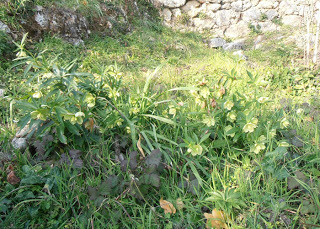
The mimosa is flowering and the grass is starred with purple/pink anemones and tiny narcissi. The creamy green hellebore we call 'Easter Roses' are everywhere. The sun has warmth in it - enough to sit out and drink a glass of wine wearing only a jumper. It certainly lifts the spirits.
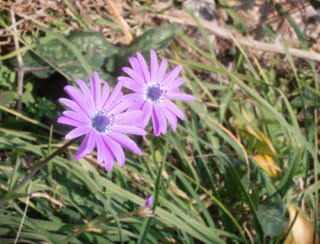
It has obviously affected the cats as well. Our adopted wild cat, Batcat, (who turned out to be female) has been sitting in the olive grove wowling at the spring sun (and everything else) in a very ominous way and it seems as though every tom cat in the village is strutting across our terrace trying to look suitably feral. After dark there's a great deal of tumbling and chasing and more singing - a kind of feline X-factor! I fear this means kittens for Easter, but Batcat sadly isn't tame enough to catch, put in a box and take to the vets. Yet.
I was given a couple of preview copies of Young Adult novels to read when in the UK - 'Wonder' by P.J. Palacio and 'Now is the Time for Running' by Michael Williams - neither of them out until the beginning of March. It's interesting to read another genre, also interesting to see what publishers are buying from abroad - one was a best seller in America, the other in southern Africa before being brought over here. UK publishers aren't taking many risks these days.[image error]
Published on February 26, 2012 08:42
February 23, 2012
Guest Post: Wendy Robertson on John McGahern's 'Amongst Women'

I'm on my way back to Italy at the moment, and it's a real treat to have best-selling novelist Wendy Robertson as a Guest Blogger to talk about writers' retreats and a particular writer, John McGahern, whose novel 'Amongst Women' has meant a great deal to her. Over to Wendy!
John McGahern - Amongst Women
I have participated in several writers retreats and now have run a few. Something significant always happens at writer's retreats: they can be life changing events.
I met the late, great John McGahern at my first writer's retreat at Lumb Bank in Yorkshire – a great place on the side of a hill with a scattering of garden huts furnished with a chair, a bench, and a great view of the countryside. I had been suffering from overwork and a loss of confidence.
At that time I'd had three children's books published and was hungry – not to write a better book as I knew writing for children can be the highest part of our calling – but I felt the need for bigger scope and scale: the opportunity to fly higher, dig deeper. So I saved my hard earned pennies and went to Lumb Bank, exhausted, clutching half a novel and shot through with that down feeling you get in the middle of a novel. 'What have I done? Is this any good? Is this no good? This is no good.'

John McGahern was one of the two tutors on that retreat. I'd read The Dark – a masterpiece of a book – but knew little about the writer. A good tutor, he read my half-book and I shared my misgivings, my lack of confidence about it, and my sense of foolishness. He chuckled. 'You're surely joking, Wendy. Sure, I see you're a great writer!' And he went on to tell me why. He gave me the confidence to surge on and write many more adult novels. He treated me as an equal, a fellow artisan.
One morning we talk about an extract from my manuscript where a girl is walking with a basket up a bank. She lifts up her skirt to show her friend where her brothers have kicked her, leaving boot marks on her thigh. John then talks with some intensity about how much one can render in fiction the dark things that have really happened to you. And he tells me something so terrible it could not make its way onto even his pages which – always beautifully written – are undercut with the complex interplay of cruelty and control, love and loyalty inside the crucible of family life.
His work is cut through with the chillingly honest view of his own difficult childhood which is a strong strand of most of his fiction, often dominated by the figure of the strong, cruel, seductive father. His fiction - emerging as it does out of his territory of rural Ireland - consistently reflects on the politics of family life where power, and even love, is wielded in subtle and brutal ways. He allows the reader access to these excesses by rendering the highly subjective experiences of his characters in a pared- back, detached style allowing the reader to infer the terrors for themselves. As well as this he allows us some rest for our emotions - with his great prose, his acute observation and lyrical rendering of time and season in rural Ireland.
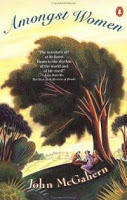
Amongst Women, his 1990 prize-winningIt is significant that the daughters, whom he bullies, manipulates and dominates, adore him and make excuses for him to each other and to Rose and other outsiders. And the final irony – and the brilliance of the perception in the writing – is that these women do not break down. At his death, around which the whole of this novel is tuned, they become their father. He has created them. He is in their hearts, in their skin, in their soul.
I have many other stories emerging from this particular writing retreat but this is the most important. Writing retreats, as I say, can change your life.
Wendy has two wonderful blogs of her own which you can check out athttp://www.lifetwicetasted.blogspot.com/ http://wendysloveaffairwithbooks.blogspot.com/
Wendy Robertson grew up in the North of England, one of four children whose widowed mother, an ex-nurse, worked in a factory. Wendy has worked as a teacher and lecturer, gaining a Masters whilst also writing short stories, articles, a column in the Northern Echo and novels for young adults. She is the author of more than 25 novels, including the wonderfully titled, 'Sandie Shaw and the Millionth Marvell Cooker' (published by Headline). She was Writer In Residence at Long Newton Prison, an experience that resulted in a novel ' Paulie's Web ' now available on Amazon Kindle. She is now part of the Room to Write group and writes and presents a radio programme 'The Writing Game' for writers and readers on Bishop FM. Her most recent books are a memoir, The Romancer, and two novels ' An Englishwoman in France' and 'A Woman Scorned'.
Published on February 23, 2012 05:48
February 20, 2012
Tuesday Poem: Rae Armantrout - Making Poetry out of Crisis
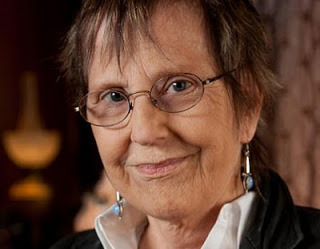
Poets are expected to be contemporary and some even expect poetry to be subversive and offer solutions to (or at least analysis of) social turmoil. Most of us remember, or carry around, scraps of poetry that have offered comfort or support in uncertain times, and some of us were maimed for life by having to learn the Charge of the Light Brigade at primary school! But writing overtly 'political' poetry is very difficult and the results can be dire. I found this fascinating video (link below) on the Poetry Foundation site. Rae Armantrout, a Pulitzer Prize-winning poet, talks about how and why she writes about contemporary situations and reads some of the poems from her new collection 'Money Shot'.
The title has references only regular viewers of pornography might recognise - in these poems the financial 'exploitation and greed' that has ruined us all is identified as a different kind of pornography. One reviewer writes that Rae Armantrout's poems 'work off the sleazy undercurrent of contempt and lazy petulance which one sees, or reads and hears expressed everywhere these days. The underlying quest of Armantrout's critique of our language is to identify and tag those elements which threaten to compromise our potential for goodness, or fulfillment, or ease.' The poems themselves are deceptively spare.
Money Talks
1 Money is talkingto itself again
in this season'sbondageand safari look,
its closeout camouflage.
Hit the refresh buttonand this is what you get,
money pretendingthat its hands are tied.
2 On a billboard by the 880,
money admonishes,"shut up and play."
Interview and Readings here: -
http://www.poetryfoundation.org/features/video/313
For more wonderful Tuesday Poetry, please check out the Tuesday Poem website by clicking here.
Published on February 20, 2012 14:55



